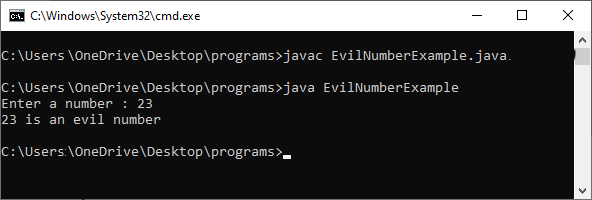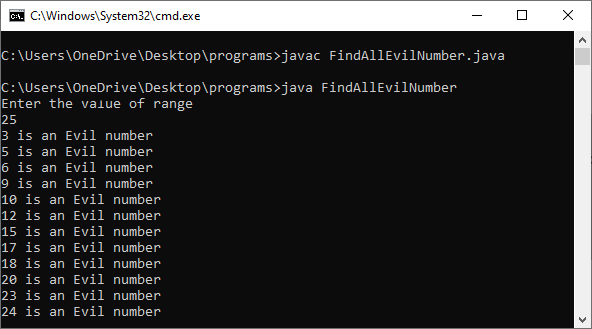In Java, there exists a unique type of positive whole number known as an Evil number. It possesses an interesting characteristic in that its binary representation contains an even number of 1’s. Although not as well-known as Prime and Armstrong numbers, Evil numbers are not typically a topic of focus during interviews.
Evil and odious numbers are two types of numbers based on the count of ones in their binary representation.
- An evil number is a number that has an even number of ones in its binary representation. For example, 15 is an evil number because its binary representation, 1111, contains an even number of ones.
- On the other hand, an odious number is a number that has an odd number of ones in its binary representation. For instance, 16 is an odious number because its binary representation, 10000, contains an odd number of ones.
- Similarly, 23 is an evil number since its binary representation, 10111, has an even number of ones.
To determine whether a number is evil or not, the following steps can be followed:
- Take a number as input.
- Convert the number to its binary equivalent and save it in a separate variable.
- Count the total number of ones in the binary representation.
- If the count of ones is an even number, then the number is classified as an evil number.
- Conversely, if the count of ones is an odd number, the number is not classified as an evil number.
Let’s write the code to check whether the number is evil or not.
EvilNumberExample.java
//import required classes and packages
import Java.util.*;
import java.io.*;
import java.util.Scanner;
//create EvilNumberExample class to check whether the given number is an Evil number or not
public class EvilNumberExample {
// create checkNumber() method that returns true when it founds number Evil
public static boolean checkNumber(int n) {
// find the equivalence binary number using user defined convertToBinary() method
long binaryNumber = convertToBinary(n);
// find total number of 1's in binary number
int count = 0;
// iterate each digit of binary number
while(binaryNumber != 0) {
// if the last digit of binary number is 1, increase the count value
if(binaryNumber % 10 == 1)
count++;
// remove the last digit from the number
binaryNumber = binaryNumber / 10;
}
// check whether the value of count is even or odd
if(count % 2 == 0)
return true; //return true when the value of count is even
//return false if the value of the count is false
return false;
}
//create convertToBinary() method to convert the decimal value into binary
private static long convertToBinary(int number) {
long binaryNumber = 0;
int rem = 0;
int j = 1;
while(number != 0) {
rem = number % 2;
binaryNumber += rem * j;
number = number / 2;
j = j * 10;
}
return binaryNumber; //return the binary equivalent number of the decimal number
}
//main() method start
public static void main(String[] args) {
// declare variable in which the user entered value will be store
int num = 0;
// create scanner class object
Scanner sc = new Scanner(System.in);
//display custom message
System.out.print("Enter a number : ");
//get input from user
num = sc.nextInt();
// check whether the number is evil number or not
if(checkNumber(num))
System.out.println(num + " is an evil number");
else
System.out.println(num + " is not an evil number");
}
}
Output

FindAllEvilNumber.java
//import required classes and packages
import java.util.*;
import java.io.*;
import java.util.Scanner;
//create a class to get all the Evil number in a given range
public class FindAllEvilNumber {
//main() method start
public static void main(String args[])
{
int range;
//create scanner class object
Scanner sc=new Scanner(System.in);
//show custom message
System.out.println("Enter the value of range");
//store user entered value into variable range
range = sc.nextInt();
for(int i = 1; i <= range; i++)
if(checkNumber(i)){
System.out.println(i + " is an Evil number");
}
}
// create checkNumber() method that returns true when it founds number Evil
public static boolean checkNumber(int n) {
// find the equivalence binary number using user defined convertToBinary() method
long binaryNumber = convertToBinary(n);
// find total number of 1's in binary number
int count = 0;
// iterate each digit of binary number
while(binaryNumber != 0) {
// if the last digit of binary number is 1, increase the count value
if(binaryNumber % 10 == 1)
count++;
// remove the last digit from the number
binaryNumber = binaryNumber / 10;
}
// check whether the value of count is even or odd
if(count % 2 == 0)
return true; //return true when the value of count is even
//return false if the value of the count is false
return false;
}
//create convertToBinary() method to convert the decimal value into binary
private static long convertToBinary(int number) {
long binaryNumber = 0;
int rem = 0;
int j = 1;
while(number != 0) {
rem = number % 2;
binaryNumber += rem * j;
number = number / 2;
j = j * 10;
}
return binaryNumber; //return the binary equivalent number of the decimal number
}
}
Output

For a comprehensive understanding of topics such as Evil Number in Java, be sure to follow tutorials.freshersnow.com to expand your knowledge.
